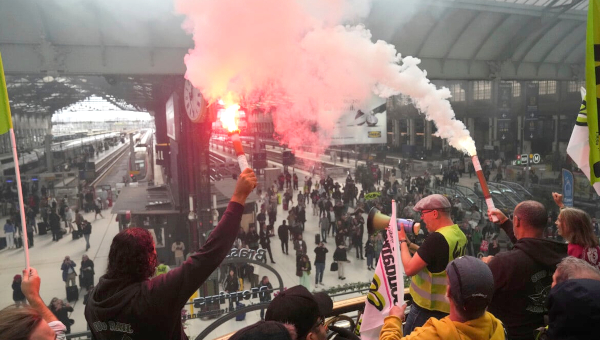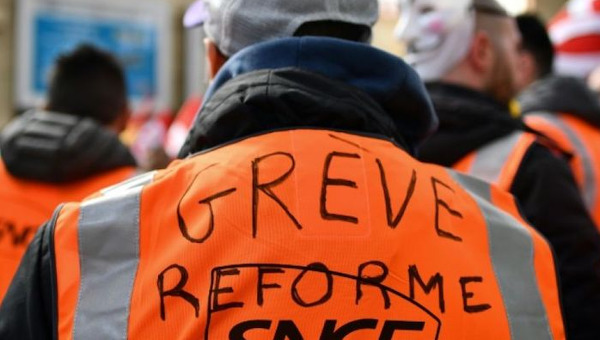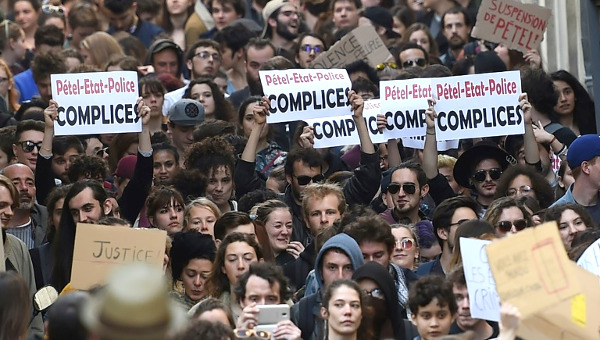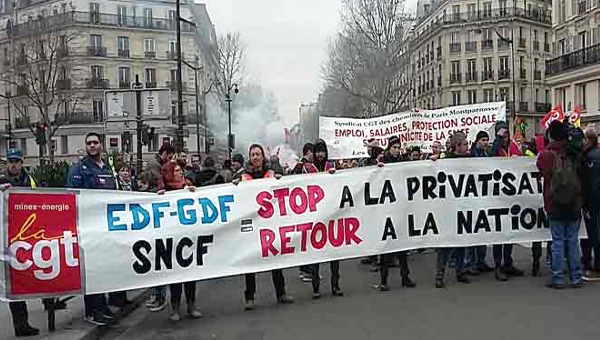“The 49-3 is a brutality. The 49-3 is a denial of democracy.” Despite French President François Hollande’s opinions on this article of the French constitution in 2006, his government under Manuel Valls (who had himself been among the MPs proposing it be suppressed in 2008) used it to force through the unpopular law proposed by Minister for Labour Myriam El Khomri on May 10. This provoked an immediate reaction from the coordinating committee of workers’ and students’ unions calling days of national mobilization and strikes on May 12, May 17, May 19, to continue on May 26 and June 14.[1]
This article, originally written just before the government’s decision to use the 49-3, explains the development of the movement against the El Khomri law up to that point. It was updated on 24 May.
France has entered a new situation since the beginning of March. Previously it was dominated by the political polarization exerted by National Front and the parallel rise of the ‘national security’ climate following the terrorist attacks in January and November 2015. None of these elements has been cancelled out and you would have to be blind to think that all of that had been swept away by the present movement.
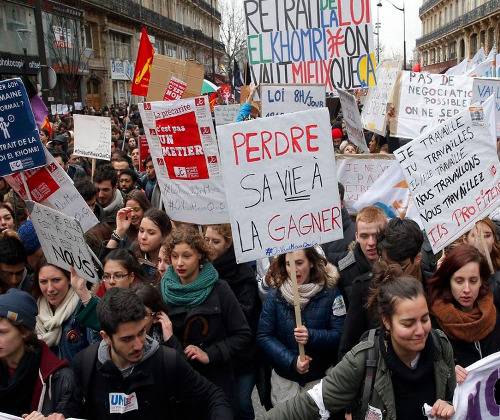 But the key political event of recent weeks is that despite these two elements, which weigh heavily on political and social life, there has developed a multifaceted mobilization which already deserves to be compared with the great mobilizations of workers and youth over the last fifteen years: those of 2003, 2006 and 2010.
But the key political event of recent weeks is that despite these two elements, which weigh heavily on political and social life, there has developed a multifaceted mobilization which already deserves to be compared with the great mobilizations of workers and youth over the last fifteen years: those of 2003, 2006 and 2010.
Social Confrontation
In the months preceding March, we could sense the beginnings of a social confrontation. First of all with the broad current of sympathy expressed with the mobilization of Air France workers, with the episode of the shirt last October.[2] In the same period, the number of walk-outs and strikes in workplaces, especially small and medium-sized ones, increased significantly, especially on issues of wages during mandatory annual negotiations. Similarly, there was the strength of the mobilization on climate change at the time of COP21, even though the terrorist attacks in November and the introduction of the state of emergency allowed the state to break the momentum of the street mobilizations. Big demonstrations against the Notre Dame des Landes airport and the establishment of support networks for migrants were also the result of action by tens of thousands of young people and activists that were coordinated by associations and social networks.
The first lesson of these reactions and these mobilizations was that the management of capitalist interests by social democracy, weak political opposition to the left of the PS and the lethargy of the union leaderships were not synonymous with an equivalent lethargy and drift of the whole of society, starting with a large section of workers and young people, hit hard by policies of austerity and unemployment. On the contrary; the situation already gave an illustration of the profound alienation from and discredit of the institutional parties, who have alternated in government over the last twenty years. It is this discredit, in the absence of social struggles, that has favoured the steady rise of abstention and the vote for the National Front among popular layers in recent years.
On the social terrain, since the beginning of Hollande’s term of office, many demands of the MEDEF (employers’ organization) concerning labour law have been implemented through the Macron and Rebsamen laws, continuing the work of unravelling workers’ rights that was begun in particular by the Fillon laws in 2008. The adoption by the Socialist governments of the employers’ credo on “labour costs” was the prelude to the National Inter-professional Agreement establishing competitiveness agreements. All this represented so many steps toward aligning France on the same level as other European countries in terms of pushing back social rights.
The El Khomri Law, a Social Detonator
So the El Khomri law, at the heart of which is the reversal of the hierarchy of norms, has become a social detonator. Obviously, because of its content – which abolishes the principle of favour while including many other attacks – but especially because of all the other elements of the present context, it has been a real catalyst.[3]
This is not the place to lay out immediate perspectives and it is much too early to make a balance sheet of this movement, which could lead to a major confrontation and a political crisis, but could just as well fail in the face of the many brakes on it that exist.
However several elements can already be highlighted:
- First of all, the way it started. There was a lot of preparatory work done by activist networks, including the Copernicus Foundation, the CGT and the Solidaires union federation, on the Combrexelle report and the Badinter project. But the mobilizing factor, the trigger and the call to demonstrate on March 9 were clearly and directly due to the scial networks with what is known as the “Caroline De Haas petition.”[4]
- What is revealing is the tone of the petition, clearly demanding the withdrawal of the law, branding it as a frontal attack, a tone which should be compared with the declaration on February 23 by the union leaderships. Not only did they not at all demand the withdrawal of the law, limiting themselves to a few measures, they complained especially about the lack of dialogue and concluded on the need for the government to meet with them… Without any call to the slightest mobilization.
- Similarly the call to the first event, which was also the occasion numerous calls to strike, came from an appeal that started from social networks and was supported very quickly by the initiators of the petition.
- We must insist on this point, because what might seem to be trivial is indicative of a general orientation of passivity by the confederal union leaderships (the position of Solidaires is not to be put in the same category). This obviously draws support from the feeling of pessimism present among many union activists after the failure of the last great mobilization in 2010 (which was again linked to the policies of the union leaderships); but it is the result of a general orientation in relation to austerity policies that has been combined since 2012 by the refusal to create too much trouble for a left government.
So the union leaders in no way sought, before the announcement of this law, to prepare their activists for a mobilization by conducting campaigns of explanation, providing information, and raising the awareness of workers. And that is without even talking about conducting more political preparatory work, making the balance sheet of 2010 and putting forward the need for an a broad united movement, for a general strike to force the government to retreat. Two months later, the absence of this preparatory work is still being felt. It was even more necessary because over the last 30 years the working class and all the popular strata have accumulated many defeats on the social terrain, following a series of neoliberal attacks.
The Mainsprings of the Mobilization
But in this country other contradictory elements are present and it is from them that the dynamics of the mobilization draw support:
- The French situation is still at odds with those experienced by other European countries, in which the capitalist juggernaut has done much more harm. There is a broad consciousness of what still remains to be preserved, of what not to lose in the fields of services, social security, employment regulations, labour laws. From this point of view, the neoliberal cultural revolution of the Socialist Party faces many obstacles, even in what is left of its electoral support and its networks of activists. The reactions of the dissident Socialists and the initiators of the petition express this reflex of self-preservation of circles close to the PS or to the Front de Gauche (Left Front).[5]
- The activists of the social movement as a whole keep in mind the memory of defeats, but also of strong mobilizations of workers and youth. Until 2010 the country had regularly experienced full-scale confrontations, by workers against pension reforms in 1995, 2003 and 2010, in a powerful movement drawing its strength from university and school students in 2006, leading to victory against the CPE (First Employment Contract). It should also be emphasized that the victory of 2006 against the Villepin government was obtained after the government had to force through its law by using Article 49.3. This lesson should be retained because the government is following the same procedure which will take at least until the end of June (with a necessary passage through the Senate and return to the National Assembly).[6]
- In a different vein, many people, young and not so young, in the popular neighbourhoods also preserve the memory of the urban revolt led by the youth of those popular neighbourhoods for four weeks in October-November 2005, after the death of Zyed and Bouna in Clichy-sous-Bois. This revolt provoked a profound break between the youth and practically all parties and movements, apart from some of the far left (including the LCR). This break with the neighbourhoods, which were stigmatized by Sarkozy at the time,[7] especially as regards young Arabs and Blacks – who were targeted by all the law and order campaigns, but who were also the first victims of unemployment and job insecurity – has persisted in recent years and has been compounded by the wave of Islamophobia that has swept the country since January 2015. This break is also visible in the present movement, whereas, paradoxically, these young people were very active in the movement of 2006, a few months later, against the CPE.
- The dismantling of social, political and trade-union structures. Until the late 1990s (the late twentieth century, therefore …), the workers’ movement, including its political wing, constituted a fabric made up of many threads, a fabric with many tears in it, but which still maintained some common references coming from its from history and its ‘great’ battles.
The 2000 decade and the return of social democracy to government transformed the earlier tears in the fabric into deep cuts. This has meant, in particular, that new generations of, often radical, activists, involved in migrant, anti-fascist, or climate struggles, active in many union branches, especially in precarious sectors, do not live their struggles as being part of a defunct ‘workers’ movement’. Contradictorily, whereas the old generations of activists, absorbed by institutional politics, have thrown away their revolutionary hopes, the new generations, which do not have the same traditional baggage, often have a strong awareness of the evils of capitalist barbarism and are always receptive to political arguments about the need for revolutionary transformation. This consciousness is often combined with a very strong demand for real democracy, and a rejection of delegation of decision-making – the heritage of the fiascos of Stalinism and of social democratic governments. There remains a profound heterogeneity among these younger generations (there is not a ‘youth’, there are young people …). There is obviously a social cleavage, which is reinforced by the cleavage of young people from the popular neighbourhoods, driven by a racist society to define themselves as Blacks, Arabs and Muslims. All young people were not Charlie… The present movement can overcome many of these divisions, but it has not happened yet.
- The restructuring of the economic fabric, in industry and services, obviously has very considerable effects on the difficulties of organizing and the atomizing of consciousness. As well as political disintegration of the workers’ movement there is objective destructuring (subcontracting, undermining of job status …) whose effects have not really been opposed by the trade union movement. The difficulties of mobilization and extension in many sectors are obviously also related to this reality, which further weakens the consciousness of belonging to the same class.
Political Crisis
Recent weeks have also revealed the level of political crisis. There is obviously first of all the crisis of the institutional parties. The permanent repudiation of the government and the Socialist Party is reflected in the situation of blockage in which the government finds itself, unable to get its own MPs to vote in support of its policies (whatever the final outcome of the parliamentary debate on the El Khomri law).[8] This discredit is also reflected in the polls; the trend is undeniable and makes this government and the Hollande-Valls couple the most widely rejected in the polls, probably since the beginning of the Fifth Republic. The corollary of this crisis is obviously the internal crisis of the PS, illustrated by the grotesque debates around the idea of a primary on the left – which accentuates the crisis of the PCF – and the place that is being taken by Emmanuel Macron.[9] Even the project of Valls, to rapidly make the PS the French equivalent of Matteo Renzi’s party in Italy, is losing its substance, overtaken on the right.
This crisis is finding its symmetrical counterweight in the crisis of the Republicans.[10] … In the final analysis, for the same reasons.
Today, all the mainstream parties in Europe are hit and severely attacked by the changes imposed by globalization and the neoliberal reforms brutally imposed since 2008. After Greece, Italy and the Spanish State, in its way, France is seeing a level of discredit of these parties that is sending out alarm signals. This obviously poses the need for the bourgeoisie to restructure its political apparatus, breaking down boundaries that appear obsolete.
In France, the crisis may soon be matched by a deeper crisis of the institutions and of the political system itself. The institutions of the Fifth Republic were designed for a system dominated by one party, the same party in the Senate, in the National Assembly and in the Elysée Palace, around a strong regime and a strong President. With the crisis of Gaullism and of the dominant bipartisanship, it was necessary to introduce the reform of 2001 which established a presidential regime, welding the parliamentary majority to the President. It was a crisis solution to the vagaries of cohabitation. But once again, this meant maintaining a supremacy of the dominant parties.
Today, the rise in the level of abstention and of the National Front, the discredit of the Socialist Party and the Republicans (LR, former UMP) is rendering this edifice fragile. It also illustrates that France, despite the “values of the Republic,” is – along with the United Kingdom – the country that has the most archaic electoral system, with election in single member constituencies and no proportional representation. France is even worse than the UK, since the direct election of a President holding strong political power makes it the only country effectively led by a monarch in the major countries of the European Union.
Valls and Hollande have tried in recent weeks to curb the political crisis in various ways.
First, by trying to muzzle the Socialist Party and its parliamentary group. The use of 49-3 for the adoption at first reading of the El Khomri law was obviously aimed at trying to cut short a public policy debate, that would further undermine the government. But it also sought to rein in the minority of ‘dissident’ PS MPs, forced to choose submission or an open break through presenting and voting for a motion of censure. In fact, for a time, the internal opposition in the PS dodged the issue. Only 28 members of the PS (over 40 dissidents) supported the putting down of such a motion. The text of a motion of censure must win support of 10% of MPs to be submitted to the vote. The left motion gathered support from only 56 members instead of 58 … In any case, the PS has sunk further into crisis.
Furthermore, while it is politically weakened, the government is seeking all the more to assert its authority through repression. Recent weeks have seen a rising crescendo of police violence, the affirmation of the power of a police state, strengthened by the prolongation of the state of emergency which is turned directly against the movement, strikes and demonstrations. The media, in government hands and big business, serve as direct channel of propaganda masking police violence, orchestrating a campaign against ‘thugs’ while seeking to criminalize the movement. This authoritarianism tends to mask the weakness of this government and the PS. Weakness in its ranks, weakness in the Assembly and weakness in its own social base.
So the last element characterizing this movement, seen especially in the debates of Nuit Debout[11] is the profound gap between the demands of democracy, between the choice of decisions made by those concerned and not by uncontrollable officials and the reality of the system and its institutions. It clearly appears both that the political system is profoundly undemocratic and that real power lies obviously outside the elected assemblies. The banks and the multinationals, the centres of capitalist power, not only make laws but exonerate themselves from respecting them.
The rejection of the financial system, energy choices, border closures, policies of unemployment and precarious work are the ingredients that are producing a rejection of the political system, but also of the capitalist system itself. This is latent in society and it is patently obvious in places where people express themselves, such as Nuit Debout.
So this movement contains many strengths and weaknesses. The coming weeks will tell which will dominate.
Necessity and Lack of Political Representation of
the Exploited and Oppressed
This only highlights the need and the absence of a political party with a discourse and action that unifies, and unites, all these different elements by staying focused on what makes a common force, and it must define a common goal: the general struggle against a political system that has produced the Panama Papers, Calais and the thousands of migrants killed in the Aegean, climatic disturbances, insecurity and social misery…
The movement that is developing calls into question both the objectives and the structures of the capitalist economic and social system and denounces the reality of the places where power lies and the anti-democratic rules of political life and decision making.
It therefore poses the question of the political representation of the exploited and oppressed and of a project of society capable of meeting the demands that are emerging. The social struggles of recent months (over the climate, migrants, Notre Dame des Landes, the El Khomri law and many, many strikes) pose all the elements of resistance to the system; they pose demands, both fundamental and immediate, and they outline the paths toward a society that will be guided by fulfilling social needs and will provide the political instruments to achieve these demands, instruments of real democracy, involving choice, debate and decisions. Social struggles and political perspectives (not electoral politics) will be a permanent part of it. All these elements of struggle and resistance will come up against a class society that is brutal, determined to maintain and increase exploitation and that is forging and reforging national and European institutions to be seats of untrammelled power, entirely dedicated to maintaining the system and escaping more and more from any kind of democratic and popular control.
The Greek experience, the rejection of migrants, the Panama papers and TAFTA have illustrated, in less than a year, many elements of the way that this society really functions. The debate around these issues is indispensable among those who have been activists of social movements for years. It is indispensable among the younger generation, which by different paths is raising the same strategic questions. This requires putting forward ‘transitional’ demands that attack the heart of the system of capitalist exploitation, that attack the social oppression that structures it and also the institutions and the undemocratic rules of the political system; transitional demands that trace the path toward a society free of capitalist exploitation and able to eliminate all forms of oppression. •
This article was published in English by International Viewpoint.


